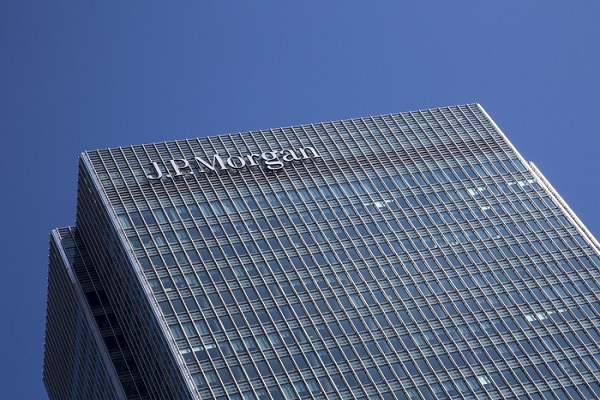ii view: banking mammoth JP Morgan reports record revenue
14th April 2023 15:15
by Keith Bowman from interactive investor
Summarising its balance sheet as fortress-like and with a dividend yield of around 3%. Buy, sell, or hold?

First-quarter results to the 31 March
- Revenue up 25% $39.3 billion
- Net income up 52% to $12.6 billion
- Earnings per share up 56% to $4.10
Chief executive Jamie Dimon said: “The US economy continues to be on generally healthy footings — consumers are still spending and have strong balance sheets, and businesses are in good shape. However, the storm clouds that we have been monitoring for the past year remain on the horizon, and the banking industry turmoil adds to these risks.
“The banking situation is distinct from 2008 as it has involved far fewer financial players and [there are] fewer issues that need to be resolved, but financial conditions will likely tighten as lenders become more conservative, and we do not know if this will slow consumer spending.”
- Invest with ii: Trade US Stocks & Shares | US Earnings Season | Open a Trading Account
ii round-up:
US banking giant JPMorgan Chase & Co (NYSE:JPM) reported both revenues and earnings that beat Wall Street estimates as higher interest rates pushed net interest income up by almost half.
Record revenue of $39.3 billion (£31.6 billion) surpassed analyst forecasts nearer to $36 billion, helping to propel earnings up 56% to $4.10 per share. That came despite taking bad debt provisions of $2.3 billion, similar to the previous quarter.
JP Morgan shares, which are a constituent of the Dow Jones 30 index, rose more than 6% in early US trading having come into this latest announcement down by close to 4% year-to-date. Shares for European rival Barclays (LSE:BARC) are down by a similar amount during 2023, while the benchmark S&P 500 index is up by almost 8%.
The results arrive in the wake of the collapsed Silicon Valley Bank and a subsequent mini banking crisis. JP Morgan continued to summarise its balance sheet as fortress-like, with its capital cushion or CET1 ratio increasing to 13.8% from 11.9% a year ago - comfortably ahead of the 12.5% requirement set by the US regulator.
In March, JP Morgan played its own part in helping stabilise the banking crisis, depositing $30 billion with regional and share-priced-wobbled First Republic Bank (NYSE:FRC).
- 11 US shares for your ISA in 2023
- Banking: what risks does climate change pose?
- Three things that will determine future of global banking sector
Revenues for JP Morgan’s more traditional banking business rose 35% to $15.5 billion, aided by a 6% increase in the average loan size. Net income or profit for the division rose 80% to $5.2 billion.
At its corporate and investment banking division, investment banking-related sales fell by almost a quarter to $1.6 billion with fees dropping 19%, largely due to lower debt underwriting fees. Equity market-related revenues fell 12% to $2.7 billion, hindered by strong year-over-year comparatives. Payment-related revenues climbed 55%, aided by higher rates, helping overall divisional profit up 1% to $4.4 billion.
The New York-headquartered bank in March declared a first-quarter dividend of $1 per share, unchanged from the previous quarter.
ii view:
JP Morgan operations cover both traditional consumer and corporate banking along with investment banking and asset management. A stock market value of more than $370 billion is comfortably above second place Bank of America (NYSE:BAC) at around $225 billion and around four times that of Citigroup (NYSE:C). Its home North American market generates its biggest slug of sales at around three-quarters of overall revenues, with Europe and Africa next at over a tenth.
For investors, accompanying management comments highlighting a cocktail of outlook uncertainties, and now including a potential slowdown in lending from the wider banking industry, should not be ignored. A hike too far in interest rates could push the US economy into recession, potentially creating further bad-debt provisions, while recent job layoffs from tech giants such as Meta (NASDAQ:META) could start to squeeze unemployment higher.
More favourably, rising rates are increasing overall revenues given the push to interest income. Bad-debt provisions now taken may prove sufficient to cover the downturn in the economy, with the bank previously over-provisioning for the pandemic. The benefits of a diversified business model covering both traditional and investment banking are historically evident, while an estimated future dividend yield of around 3% is not to be overlooked.
On balance, and while reasons for caution persist, this well-managed banking giant remains something of a play on the world’s largest economy with its place in many already diversified portfolios arguably still justified.
Positives:
- Business diversity
- Investing in technology
Negatives:
- Economic outlook uncertainty
- Elevated costs
The average rating of stock market analysts:
Buy
These articles are provided for information purposes only. Occasionally, an opinion about whether to buy or sell a specific investment may be provided by third parties. The content is not intended to be a personal recommendation to buy or sell any financial instrument or product, or to adopt any investment strategy as it is not provided based on an assessment of your investing knowledge and experience, your financial situation or your investment objectives. The value of your investments, and the income derived from them, may go down as well as up. You may not get back all the money that you invest. The investments referred to in this article may not be suitable for all investors, and if in doubt, an investor should seek advice from a qualified investment adviser.
Full performance can be found on the company or index summary page on the interactive investor website. Simply click on the company's or index name highlighted in the article.